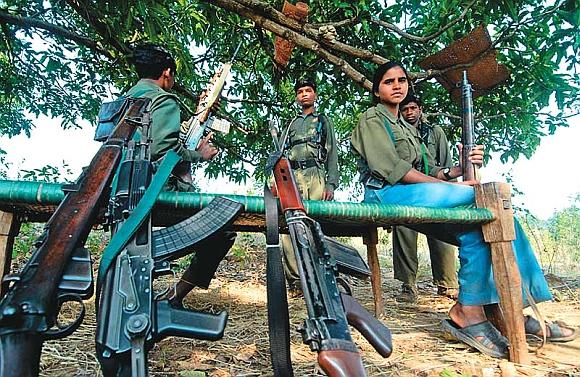
A 60-page report by the Human Rights Watch titled 'Between Two Sets of Guns: Attacks on Civil Society Activists in India's Maoist Conflict', documents human rights abuses against activists in India's Orissa, Jharkhand, and Chhattisgarh states.
Rediff.com brings you this report in a three-part series:
The Human Rights Watch has found that grassroots activists who deliver development assistance and publicise abuses in Maoist conflict areas are at particular risk of being targetted by government security forces and Maoist insurgents, known as Naxalites.
Maoists frequently accuse activists of being informers and warn them against implementing government programs. The police demand that they serve as informers, and those that refuse risk being accused of being Maoist supporters and subject to arbitrary arrest and torture.
The authorities use sedition laws to curtail free speech and also concoct criminal cases to lock up critics of the government.
"The Maoists and government forces seem to have little in common except a willingness to target civil society activists who report on rights abuses against local communities," said Meenakshi Ganguly, South Asia director at Human Rights Watch and the author of the report. "Aid workers and rights defenders need to be allowed to do their work safely and not be accused of having a political agenda simply because they bring attention to abuses."
While human rights defenders have rarely come under direct attack from Maoists, they operate in a climate of fear and are at great risk if they criticise Maoist abuses. The Maoists have been particularly brutal towards those perceived to be government informers or 'class enemies' and do not hesitate to punish them by shooting or beheading after a summary 'trial' in a self-declared 'people's court' (jan adalat).
Jan adalats do not come close to meeting international standards of independence, impartiality, competence of judges, the presumption of innocence, or access to defense.
For instance, in March 2011, Maoists killed Niyamat Ansari, who helped villagers access the National Rural Employment Guarantee Scheme in Jharkhand. The Maoists abducted him and later admitted to his killing by claiming that he was punished for 'being under the influence of the police administration, carrying out anti-people, counter-revolutionary activities, and challenging the party'.
Government authorities in Orissa, Jharkhand, and Chhattisgarh have arbitrarily arrested, tortured, and otherwise ill-treated many civil society activists, the HRW said. They have frequently brought politically motivated charges against them, including for murder, conspiracy, and sedition.
Sedition charges are brought despite a 1962 Supreme Court ruling that prosecution under the law requires evidence of incitement to violence.
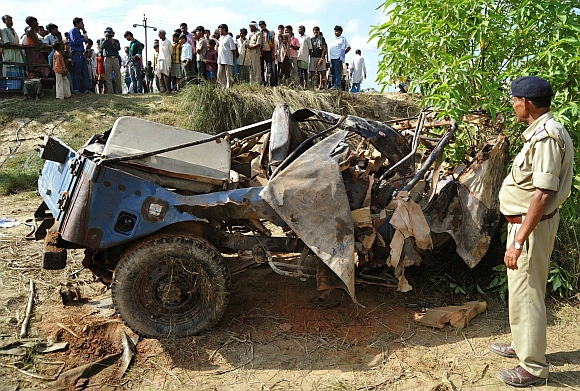
Often, these cases are dropped only when prosecutors are unable to support the allegations in court. But by then the activists have already served unnecessarily long periods in detention because their bail pleas are routinely denied. The police have often attempted to justify these actions by discrediting activists as Maoists or Maoist supporters.
Lingaram Kodopi worked on tribal rights in India's Chhattisgarh state. Both the Maoist insurgents, commonly called Naxals or Naxalites, and local government authorities, were suspicious of him. In 2009, the police detained Kodopi without legal basis for over a month, beat him, and demanded he join the security forces.
In June 2011 Maoists attacked Kodopi's grandfather, shot him in the leg, and ransacked the family home, accusing the family of acting as informers. Finding himself at grave risk from both Maoists and state security forces, Kodopi decided to move to New Delhi. "There is no difference between the police in my state and the Naxals," he told a journalist.
Many civil society activists working in Maoist-affected areas are similarly finding themselves under assault from both sides. The Maoists claim to be fighting for the poor and the marginalised, demanding loyalty and shelter from villagers, while government forces seek public support in protecting those same villagers from the Maoists.
But the activities of civil society activists on behalf of the impoverished and vulnerable local population put them at risk from the Maoists and government security forces alike.
The Indian prime minister has described the fight with the Maoist insurgents as India's 'biggest internal security challenge'. According to the home ministry, over 3,000 people have been killed in the Maoist conflict since 2008.
The Maoists have committed numerous serious abuses, such as targetted killings of the police, political figures, and landlords. In some cases the Maoists bring alleged 'enemies' before their self-declared jan adalat, or people's court, where the Maoists conduct public show trials.
Penalties are harsh: suspected informers are beheaded or shot. The Maoists have also abducted public officials and ordinary villagers. In March 2012, they abducted two Italian tourists and a legislator, holding them as hostages in exchange for the release of captured Maoist fighters.
In April, they abducted a district administrator after killing his bodyguards. They have also attacked schools and health centers as symbols of the government.
The security response of the government to the Maoist threat has resulted in serious human rights violations. State security forces -- typically police and paramilitary forces -- have arbitrarily arrested, detained, and tortured villagers, who are mostly from disaffected tribal communities.
...
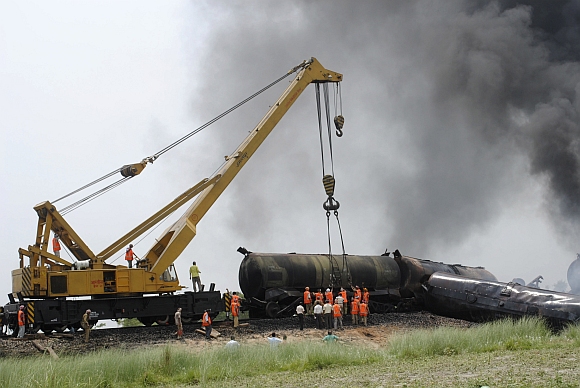
Unable to locate the Maoist fighters who deploy hidden in the forests and ambush soldiers on patrol, the security forces have frequently gone after the 'soft target' of civilians suspected of being Maoist supporters. After Maoist ambushes, government security forces have at times assaulted villagers, and burned down their homes in retaliation.
At particular risk are grassroots civil society activists who struggle to put an end to these abuses. Often local to the community, these activists travel to remote villages to provide assistance, and invariably encounter the Maoists.
The Maoists frequently accuse them of being informers, and warn them against implementing government programs. The police, meanwhile, demand that the activists serve as informers, and those who refuse risk, being labeled Maoist sympathisers.
Caught in the middle, many civil society activists have been arbitrarily arrested, tortured, or ill-treated, and then forced to face politically motivated charges ranging from murder to conspiracy and sedition.
Often these cases are dropped only when prosecutors are unable to support the allegations in court. But by then the activists have already served unnecessarily long spells in detention because their bail pleas are routinely denied.
Police have often attempted to discredit human rights activists by describing them as Maoists or Maoist supporters. In July 2011 the Supreme Court expressed anguish at the Chhattisgarh government's arbitrary assumption that all those who speak for human rights are Maoist sympathisers.
The situation is complicated by the fact that some activists do act as fronts for or are ideological supporters of the Maoists. Where this support violates the law, as when individuals deliberately provide information or assistance that aids and abets Maoist attacks or other criminal activity, the authorities have a responsibility to arrest and prosecute them in accordance with due process standards.
However, the authorities should act only when they have specific credible evidence an individual has engaged in criminal acts and never on blanket assumptions that activists who criticise the authorities or have contact with Maoists, are criminally abetting Maoist crimes.
On the night of August 12, 2008, police arrested activist lawyer Pratima Das while she was travelling in a car with David Pugh, an American environmental activist, as they returned from a 'people's protest' in eastern Orissa state. While police released Pugh after questioning, they detained Das simply on the assumption she was a Maoist supporter. She told HRW:
They really tried to frighten me. They asked about various Maoist leaders, and other ideologues. I said I had nothing to hide. I asked for my family, for my senior lawyer, but they refused to inform anyone. But they searched my house, and although they did not find anything, they made my brother sign a blank paper.
...
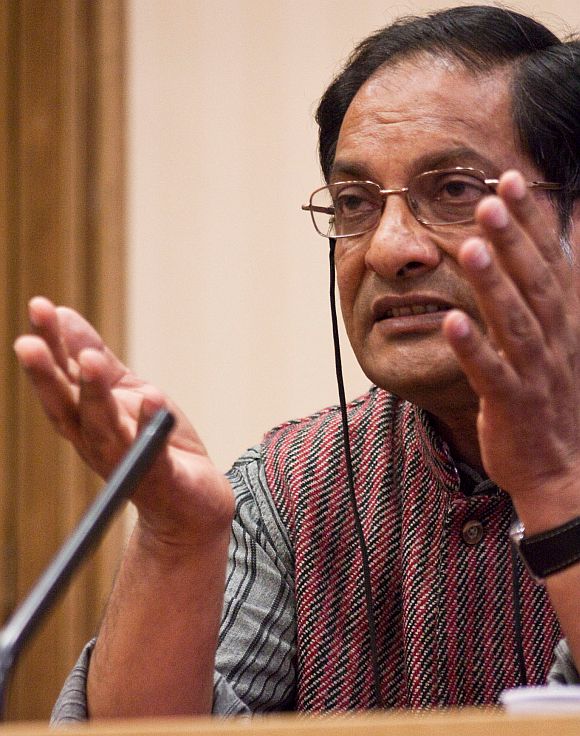
Later I found that they had already told the media that a big Maoist leader had been arrested and that they had recovered Maoist literature from me. But the police knew I was innocent. They even said, "We know you are not involved in action. But why do you work on Maoist issues?"
The police later charged Das with attempted murder and criminal conspiracy. She was acquitted after spending nearly two-and-a-half-years in jail.
Rabindra Kumar Majhi, Madhusudan Badra, and Kanderam Hebram, who were arrested by the police in July 2008, all suffered severe beatings in custody and were coerced into falsely confessing that they were Maoists. Police first picked up Majhi on suspicion that he was involved in a Maoist attack.
The police beat him and demanded that he identify his co-conspirators. Out of desperation he named his colleagues at an Orissa non-governmental organisation, the Keonjhar Integrated Rural Development & Training Institute. Madhusudan Badra, a colleague of Majhi, says he met an injured Majhi at the police station:
Rabi was very badly tortured by the police. They hung him from the ceiling by his leg. Then they beat him on so hard that there was a fracture in his thigh bone. Actually Rabi was beaten so badly he gave all our names. So then we were arrested.
In July 2008, James Anaya, the United Nations special rapporteur on the rights of indigenous peoples, expressed concern, "The police plans to question members of the KIRDTI may be related to their legitimate and peaceful activities in the defense of land rights of indigenous people," and that the 'physical and psychological integrity' of Majhi while in custody might be in danger.
Anaya also expressed concern about other members of KIRDTI who had gone into hiding fearing torture and ill-treatment after the arrest of their colleagues. The government responded to the rapporteur claiming that all three in custody had confessed to committing crimes. All three were later acquitted.
In almost all cases where the accused is alleged to be a Maoist or a Maoist supporter, the lower courts are reluctant to grant bail. The person is forced to remain in custody during trial and often until a decision on his or her appeal is handed down by the Supreme Court.
The police also routinely file serious charges such as murder or sedition, for which bail is hard to secure. Colin Gonsalves from Human Rights Law Network, which has been handling a number of such cases, said, "In the conflict zone, no trial court is willing to give bail. No judge wants their career damaged. It is very difficult. Even the high court is not giving any bail. So we have to approach the Supreme Court."
...
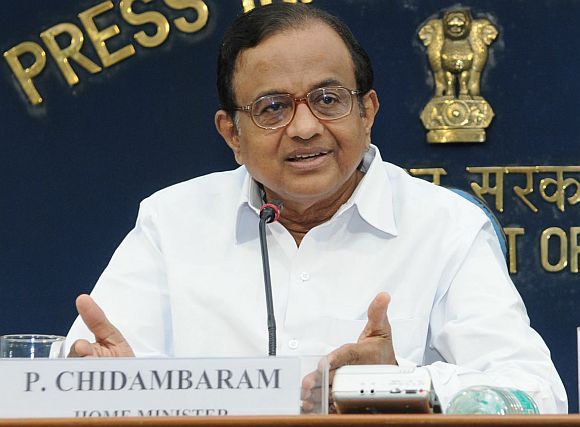
The authorities have also misused a colonial-era sedition law to try to secure convictions despite a 1962 Supreme Court ruling that prosecution under the law requires evidence of incitement to violence. Dr Binayak Sen was arrested on May 14, 2007, and accused of ferrying messages for imprisoned Maoist ideologue Narayan Sanyal.
Even though Sen's visits were under the supervision of prison authorities to provide medical and legal assistance, he was convicted of sedition in December 2010 and sentenced to life in prison. Sen appealed his verdict. In April 2011, the Supreme Court granted bail, observing that there was no evidence of sedition, but has yet to rule on his conviction.
Sen is currently out on bail.
In other instances, the threat of jail is used as intimidation. One activist said that the police repeatedly threatened him, "I was told by the police: 'We are watching. You talk too much, and you will be in jail, defending murder charges."
Activist Himanshu Kumar had to stop his grassroots work with the predominantly tribal population in the Bastar region of Chhattisgarh because of state intimidation. He built a network of local activists to implement government food and healthcare programs, and work on other development projects.
After the Chhattisgarh government began to support the Salwa Judum vigilante movement against the Maoists in 2005, he started filing complaints against Salwa Judum abuses. He became visible in the media and during protests. The district administration suddenly declared, after decades of allowing its existence, that his organisation's office was located illegally in protected forest land.
In May 2009 police demolished the structure. Unable to secure any other space in the area, and because of threats and arrests of several of his workers, Kumar moved to New Delhi. He told Human Rights Watch:
The government was angry because everyone used to meet me, and their [the government's] crimes were no longer secret.... But it was difficult. My colleagues were arrested under false charges, even murder.... The number of violent reprisals kept increasing. I began to feel my strategy had backfired -- instead of protecting them, I had made these tribal people more vulnerable. Continuing to work in Dantewada would only bring more harassment, more attacks, more arrests of people I was trying to help.
In recent years, the Maoist movement has spread to nine states in central and eastern India. The Maoists have gained support in part because government-brokered land acquisition schemes for infrastructure and mining are displacing people, including many from tribal communities who rely on land and forests for their traditional livelihood.
Routine police brutality, corruption in public service that fails to deliver on the government's development initiatives, and lack of access to resources leads to support for the Maoists who claim to defend the rights of the people. The Indian central government is aware that these disparities and abuses are fueling the conflict.
In September 2011, Prime Minister Manmohan Singh, while addressing a workshop of public officials to help accelerate development projects in Maoist-dominated districts, said that policies "must be sustainable on the ground and not on paper alone."
Discussing development needs in the Maoist-affected areas, Home Minister P Chidambaram said that left-wing extremism was the most 'formidable challenge' to governance in India.
...